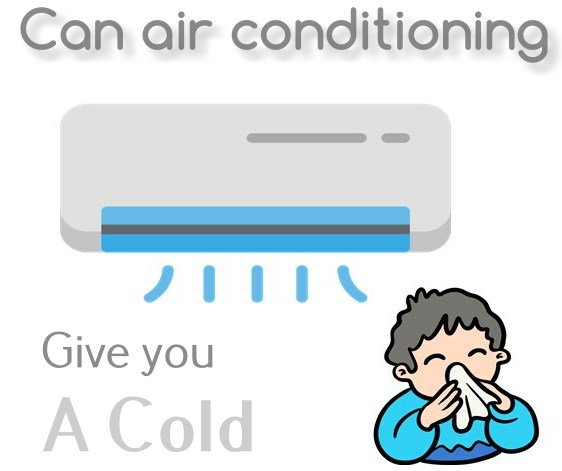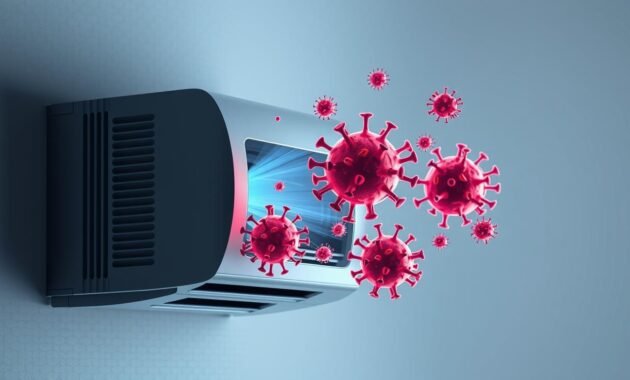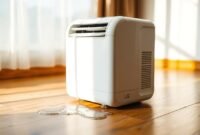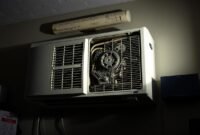Ever felt sick after being in a cold, air-conditioned room for hours? Air conditioning might make you feel unwell, but it’s not the usual way. Many people get respiratory problems from being in cold indoor spaces for too long.
The real problem isn’t the air conditioner itself. It’s the dry air, temperature changes, and less air movement it causes. These factors can weaken your immune system. I’ll explain how air conditioning affects your health and share tips to stay cool without getting sick.

Understanding the Link Between AC and Illness
Air conditioning systems have a big role in our homes. They can affect our health in unexpected ways. If they’re not kept up, they can make us feel sick and uncomfortable.
Temperature changes from AC can shock our body’s defenses. Going from warm to cool too fast can weaken our immune system. This makes us more likely to get sore throats and stuffy noses.
The Science Behind Temperature Fluctuations
Our bodies try to keep a steady temperature. But AC can cool us down too fast. This can:
- Cause muscle tension
- Reduce blood circulation
- Trigger respiratory stress
Indoor Air Quality Matters
Air conditioners move the air inside, recycling any pollutants. Dust, allergens, and germs can build up. This is a health risk if the system isn’t well-maintained.
Read also: How to Clean Mold from Air Conditioner
Humidity’s Hidden Impact
Humidity affects how comfortable and healthy we feel. If AC isn’t balanced, it can dry out the air. This can irritate our breathing and make us more likely to have stuffy noses.
Keeping your AC in good shape is more than just cooling. It’s about making your home a healthy place for you to be.
Common Symptoms of Air Conditioning Sickness

Living in air-conditioned spaces can sometimes trigger unexpected health challenges. Understanding air conditioning sickness symptoms helps you stay healthy. It also helps you recognize how the environment affects your well-being.
Cold environments created by air conditioning can produce several uncomfortable physical reactions. Your body might respond with a range of symptoms. These symptoms can mimic typical illness indicators.
- Persistent headaches
- Unexplained fatigue
- Muscle and joint soreness
- Frequent respiratory irritation
- Nasal congestion
- Dry throat
Prolonged exposure to cold indoor temperatures can weaken your immune system’s natural defenses. These air conditioning sickness symptoms often develop gradually. This makes it challenging to pinpoint the exact cause.
Temperature fluctuations stress your body’s regulatory mechanisms. Rapid shifts between hot outdoor environments and cold indoor spaces can trigger inflammatory responses. This can potentially compromise your overall health.
To stay healthy, monitor how your body reacts to air conditioning. Pay attention to consistent discomfort. Consider adjusting temperature settings or improving indoor air circulation. This can help minimize health risks.
How Air Conditioners Impact Your Immune System
Air conditioning can really affect how our body fights off sickness. The cold from AC units can start a chain of reactions. These reactions might weaken our immune system.
Being in cold air for too long changes our body in big ways. It affects our white blood cells and how well we breathe:
- Decreased white blood cell circulation
- Reduced immune system responsiveness
- Potential vulnerability to respiratory issues
White Blood Cell Response
Ultra-cold temperatures make our arteries narrow, cutting off blood flow. This hurts our white blood cells, which fight off viruses and infections. With narrowed blood vessels, white blood cells can’t fight as well.
Nasal Passage Effects
Air conditioning dries out our nasal passages. This makes it harder for our body to filter out bad particles. Dry mucous membranes let bacteria and viruses get into our lungs more easily.
Respiratory Defense Mechanisms
Long-term cold air weakens our lungs’ defenses. The cold can cause inflammation and make our lungs less effective. This makes us more likely to get sick.
Knowing how air conditioning affects us helps us keep our homes healthier. It protects our immune system from the bad effects of cold air.
Can Air Conditioning Give You a Cold?

Many people wonder if air conditioning can make them sick. But, air conditioning itself doesn’t cause colds. The real culprits are cold causing viruses.
The link between air conditioning and getting sick is complex. AC doesn’t directly create viruses. But, it can make you more likely to get sick. Here’s how:
- Reduces indoor air humidity
- Circulates contaminated air
- Weakens your body’s natural defense mechanisms
Experts like Dr. Ujwala Kaza from NYU Langone Medical Center say temperature changes don’t cause colds. The real risk is how air conditioning systems work:
| AC Condition | Potential Health Impact |
|---|---|
| Low Humidity | Dries out nasal passages, reducing virus protection |
| Recirculated Air | Increases transmission of cold causing viruses |
| Cold Temperatures | Potentially suppresses immune response |
To stay healthy, keep indoor air quality good and maintain your AC. It’s important to understand how the environment affects your health, not to fear air conditioning.
The Truth About Bacteria and Viruses in AC Systems
Air conditioning systems can become unexpected havens for bacteria and viruses if not properly maintained. The cool, moist environment inside AC units creates perfect breeding grounds for microorganisms. These could potentially impact your indoor air quality and health.
Understanding the growth conditions of bacteria and mold in air conditioning systems is key. The dark, damp spaces within AC units provide ideal conditions for microorganisms to multiply rapidly.
Growth Conditions in AC Units
Bacteria and viruses thrive in specific environments. Air conditioning systems often create these perfect conditions through:
- Constant moisture from condensation
- Dark interior spaces
- Consistent cool temperatures
- Organic material trapped in filters
Spreading Patterns of Airborne Pathogens
The spread of bacteria and viruses through air conditioning systems is significant. When AC units are not cleaned regularly, these microorganisms can circulate throughout your living or working space.
| Pathogen Type | Growth Potentia | Spread Risk |
|---|---|---|
| Bacteria | High | Moderate to High |
| Mold Spores | Very High | High |
| Viruses | Moderate | Low to Moderate |
Regular maintenance and cleaning of your air conditioning system can significantly reduce the risk of bacteria and virus proliferation. I recommend professional cleaning and filter replacement at least twice a year. This ensures optimal indoor air quality.
Proper AC Maintenance for Better Health
Keeping your air conditioning system in top shape is key for your health and clean air inside. It’s not just about cooling your home. It’s about making it safe and clean for everyone.
I suggest a detailed plan for AC care. It should cover a few important points:
- Clean or replace filters often to stop dust and allergens
- Get professional checks at least twice a year
- Inspect and clean air ducts to stop germs from spreading
- Watch humidity levels to stop mold from growing
Regular filter cleaning cuts down on airborne pollutants in your home. A well-maintained AC system boosts air quality and helps avoid health problems.
Professional HVAC techs can do deep cleanings and spot issues early. They’ll check refrigerant, electrical connections, and make sure everything works right.
Important maintenance tasks include:
- Check filters every month
- Inspect ducts every quarter
- Get professional system checks twice a year
- Do a full system clean once a year
By spending a bit of time on AC maintenance, you’ll make your home healthier. You might also save money on big repair bills later.
Creating a Healthy Indoor Environment
Keeping your indoor space healthy is more than just cooling it down. Sick building syndrome can occur when air doesn’t circulate well or is of poor quality. I’ll share some easy ways to make your home or office a healthier place.
Good indoor air quality is essential for your health. Choosing the right air filters can greatly reduce health risks linked to air conditioning systems.
Optimal Temperature Settings
Finding the right temperature is not just about feeling comfortable. It’s also about staying healthy. I suggest keeping your indoor temperature between 68-72°F (20-22°C). This range helps your body stay relaxed and your space comfortable.
- Keep consistent temperature settings
- Avoid extreme temperature fluctuations
- Use programmable thermostats for better control
Ventilation Strategies
Good ventilation is vital to fight sick building syndrome. Open windows sometimes to let in fresh air, even when using air conditioning. This simple action helps cut down indoor pollutants and makes your space feel fresher.
Air Quality Monitoring
Get air quality monitors to keep an eye on your indoor air. These tools can spot humidity, particles, and other health risks. Today’s air filters often come with smart features to help you keep your air quality top-notch.
- Use HEPA air filters
- Check filter replacement schedules
- Monitor humidity levels (ideal range: 30-50%)
Prevention Tips for AC-Related Health Issues
Enjoying air conditioning while staying healthy is all about planning. I’ve found ways to lower health risks and keep your space safe and comfy.
Drinking water is key when using air conditioning. It keeps your throat and nose moist. This helps prevent dryness and boosts your immune system.
- Use high-quality air filters to reduce airborne contaminants
- Clean or replace air filters every 60-90 days
- Maintain optimal humidity levels between 40-50%
- Take regular breaks from air-conditioned spaces
Read also: How To Clean Filter LG Portable Air Conditioner
Good air filters are essential for your health. Choose HEPA filters to catch small particles and improve air quality. Make sure to check the MERV rating for the best protection.
| Prevention Strategy | Health Benefits |
|---|---|
| Regular filter replacement | Reduces allergens and bacteria |
| Proper humidity control | Prevents respiratory irritation |
| Periodic fresh air exposure | Boosts immune system function |
Using a portable humidifier can help keep moisture levels right. It stops dry air from air conditioning, which can hurt your breathing and health.
Conclusion
Exploring air conditioning’s impact on health shows us it’s not just about the temperature. Respiratory problems can happen if we’re not careful in air-conditioned spaces.
While air conditioning doesn’t directly cause colds, it can weaken our immune system. Knowing how AC affects our health helps us stay safe and avoid risks.
Keeping air conditioning units in good shape is key. We should also watch the air quality and temperature. Clean filters and fresh air breaks help prevent respiratory issues.
The main lesson is knowing how to use air conditioning safely. By being smart and informed, we can enjoy cool air without harming our health. This way, we can keep our homes healthy and comfortable all year.


